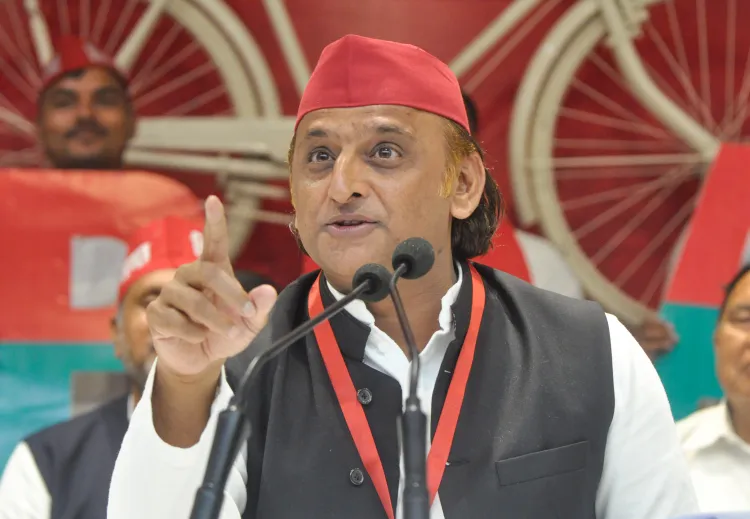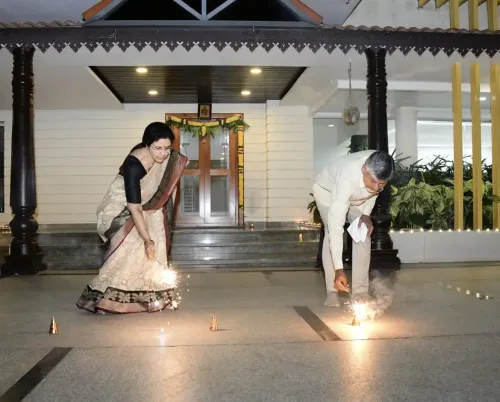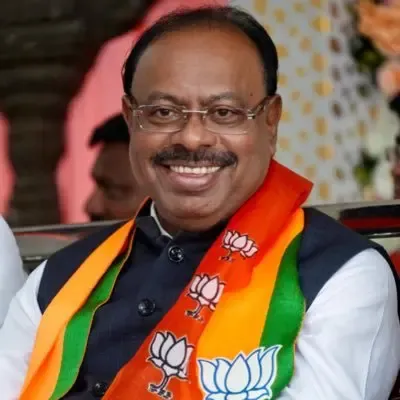Did the UP CEO Really Address 18,000 Affidavits?

Synopsis
Key Takeaways
- No original affidavits received related to the 18,000 claims.
- Clarification on roles of the CEO and SEC provided.
- Concerns about voter integrity raised.
- Potential legal consequences for false evidence.
- Emphasis on transparency in electoral processes.
Lucknow, Sep 5 (NationPress) The Chief Electoral Officer (CEO) of Uttar Pradesh has once again countered allegations made by Samajwadi Party President Akhilesh Yadav regarding the supposed inaction over 18,000 affidavits filed concerning the 'incorrect deletion' of voters' names prior to the 2022 Assembly elections.
In a post shared on X, the CEO stated: 'As of September 4, 2025, not a single affidavit out of the claimed 18,000 related to the alleged wrongful deletion of numerous voters’ names ahead of the 2022 Assembly elections has been received in original form by the District Election Officers of the relevant 33 districts and the Electoral Registration Officers of the respective 74 assembly constituencies.'
He added, 'No original affidavit regarding this complaint has reached the office of the Chief Electoral Officer of Uttar Pradesh by September 4, 2025. Once the original affidavit concerning this issue is submitted, the investigation will be conducted swiftly, and appropriate actions will be taken, keeping the public informed,' directed the CEO in his post, addressing SP leader @yadavakhilesh.
The CEO took this opportunity to clarify the distinction between the office of the CEO, which oversees elections for the Lok Sabha, Legislative Assembly, and Legislative Council, and the State Election Commission (SEC), which manages local body and panchayat elections.
Highlighting reports that may have unintentionally created confusion linking the SEC with Assembly elections, the CEO clarified: 'There is often a lack of clarity among the public and the media regarding the functions of these two commissions. Even government officials and employees frequently lack awareness of this difference.'
The post also mentioned that recent news reports in Uttar Pradesh about using Artificial Intelligence (AI) to identify and correct errors in voter lists were related to the SEC responsible for elections of Panchayati Raj institutions and urban bodies.
'The reports regarding correcting the voter list using AI do not pertain to the Election Commission of India,' stated the CEO of Uttar Pradesh.
This latest social media statement is not the first instance where the CEO has refuted claims of inaction regarding the alleged 18,000 affidavits, a topic frequently raised by the SP National President.
Previously, the CEO dismissed the Samajwadi Party's assertion of filing 18,000 affidavits from purportedly aggrieved voters as false, suggesting potential forgery in the submission of scanned copies of 3,919 affidavits by the party.
'Concerning the complaint involving 18,000 affidavits, which is often reiterated, it is made clear that not a single voter's affidavit has been received in its original form,' the CEO remarked in a prior post on X.
The state’s top election official noted: 'Through email, the complaint from the Samajwadi Party has indeed led to the reception of scanned copies of affidavits from around 3,919 distinct named individuals. The complaint addresses 74 Assembly constituencies across 33 districts.'
'The investigation concerning the complaint related to 5 Assembly constituencies has been finalized, and the results have been shared with the public via X,' added the CEO.
Warning that presenting false evidence constitutes a crime, the CEO stated: 'In the five Assembly constituencies investigated so far, it has been discovered that affidavits were fabricated in November 2022 in the names of certain individuals who had passed away years before 2022.'
'Some individuals who were shown a scanned copy created in their name have unequivocally denied ever providing such an affidavit. It is important to note that legally, presenting false evidence is deemed a crime,' the CEO emphasized.
Previously, the Samajwadi Party leader directed criticism toward the Election Commission, stating in a message on X: 'The entirety of the 2022 Assembly elections, along with all by-elections, was manipulated under the collusion and directives of the ruling BJP, while the Election Commission remained complicit in these dishonest activities, akin to Dhritarashtra, silently endorsing the BJP's corruption.'









